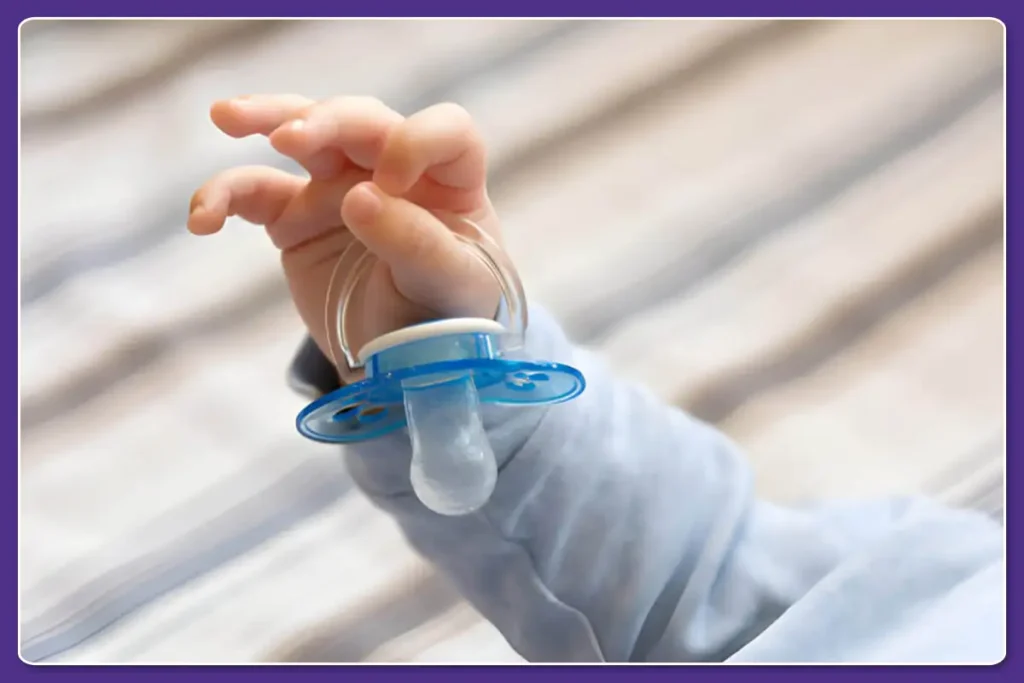Yes, silicone is generally safe for babies. It is non-toxic and hypoallergenic.
Silicone is widely used in baby products due to its safety and durability. As a parent, ensuring the safety of your baby is a top priority. With so many materials used in baby products, it’s important to understand their safety.
Silicone has become a popular choice for many baby items, including bottles, pacifiers, and teething toys. But is silicone truly safe for your little one? In this blog post, we will explore the properties of silicone, its benefits, and any potential risks. By the end, you’ll have a clear understanding of whether silicone is the right choice for your baby’s needs. Let’s dive into the world of silicone and uncover the facts.

Introduction To Silicone
Silicone has become a popular material in many baby products. Many parents want to know if it’s safe for their little ones. This blog post will help you understand silicone better. Let’s dive into what silicone is and how it’s used.
What Is Silicone?
Silicone is a man-made material. It is created from silicon, oxygen, and other elements. The process makes it flexible and durable. It can withstand high and low temperatures. It is also resistant to water and chemicals. This makes it a versatile choice for many products.
Common Uses Of Silicone
Silicone is used in many baby products. You can find it in baby bottles, pacifiers, and teething toys. It is also used in baby spoons and bowls. Parents love it for its softness and safety. Silicone products are easy to clean. They do not break easily. This makes them perfect for babies.
Silicone In Baby Products
Silicone has become a popular material in baby products. Its unique properties make it ideal for various baby items. Parents often wonder about its safety and benefits. Let’s explore silicone’s role in baby items.
Popular Baby Items With Silicone
Many baby products now feature silicone. Here are some common items:
- Pacifiers: Soft and gentle on a baby’s gums.
- Teething Toys: Safe to chew and easy to clean.
- Bottle Nipples: Flexible and durable for feeding.
- Bibs: Waterproof and stain-resistant.
- Plates and Utensils: Non-slip and easy to hold.
Reasons For Using Silicone
Silicone offers several advantages in baby products. Here are some key reasons:
- Durability: Silicone is long-lasting and can withstand wear and tear.
- Safety: It is non-toxic and free from harmful chemicals like BPA.
- Heat Resistance: Silicone can handle extreme temperatures, making it microwave and dishwasher safe.
- Softness: Gentle on a baby’s delicate skin, reducing the risk of irritation.
- Easy to Clean: Silicone is non-porous, preventing the growth of bacteria.
Parents can feel confident in choosing silicone for their babies. Its properties ensure safety and convenience.
Safety Of Silicone
Many parents wonder if silicone is safe for their babies. Silicone is a popular material for baby products. It is used for bottles, pacifiers, and teething toys. But, safety is always a top concern for parents.
Silicone is a man-made material. It is made from silicon, oxygen, and other elements. It is known for its durability and flexibility. But, not all silicone is the same. There are different types of silicone used in baby products.
Food-grade Silicone
Food-grade silicone is safe for babies. It is made without harmful chemicals. It does not contain BPA, phthalates, or lead. Food-grade silicone is used in kitchenware and baby products. It can withstand high temperatures. This makes it safe for sterilization.
Parents can feel confident using food-grade silicone products. These products are safe for baby’s food and drinks. They are also soft and gentle on baby’s gums. This makes them perfect for teething toys.
Medical-grade Silicone
Medical-grade silicone is even safer. It is used in medical devices and implants. This type of silicone is tested for safety and purity. It is free from harmful chemicals and additives. Medical-grade silicone is hypoallergenic. This means it is less likely to cause allergies.
Products made from medical-grade silicone are ideal for babies. They are safe for baby’s skin and mouth. Parents can trust medical-grade silicone products. They are designed with the highest safety standards.
Potential Risks
Silicone products for babies are popular. They are flexible, durable, and easy to clean. Yet, parents often ask about safety. Potential risks exist. Understanding these risks helps parents make informed decisions.
Chemical Concerns
One potential risk with silicone is the chemicals used. Silicone is made from silicon, oxygen, carbon, and hydrogen. Concerns arise about the possible presence of BPA or other harmful chemicals. Manufacturers claim their products are BPA-free. But, it’s important to verify these claims.
Some parents worry about chemicals leaching from silicone. This can happen when the silicone is heated. High-quality silicone products undergo rigorous testing. This minimizes the risk of chemical leaching. Always choose food-grade silicone for baby products. It meets safety standards and reduces chemical concerns.
Choking Hazards
Another risk with silicone products is choking. Silicone is soft and flexible. This can pose a choking hazard for babies. Small parts or pieces can break off. Babies explore with their mouths. They might swallow small pieces.
Always check silicone products for wear and tear. Look for any loose parts. Ensure the product is intact before giving it to your baby. Supervise your baby during use. This helps prevent choking incidents.
Scientific Research
Parents often worry about the safety of products for their babies. Silicone is a common material in baby products. But is it safe? Scientific research provides clear answers.
Studies On Silicone Safety
Multiple studies have been conducted on silicone safety. Researchers have tested silicone under various conditions. The findings consistently show that silicone is stable. It does not react with other chemicals. This makes it a safe option for baby products.
Silicone is also resistant to heat. This means it does not break down easily. Even when exposed to high temperatures. Parents can feel confident using silicone baby products. They do not release harmful substances.
Regulatory Approvals
Regulatory bodies play a key role in ensuring product safety. Silicone has received approvals from several reputable organizations. These include the FDA and European health agencies. Such approvals mean silicone meets strict safety standards.
Regulatory approvals are based on thorough testing. They examine all aspects of a material’s safety. This includes its effects on human health. The approvals silicone has received provide peace of mind for parents. It confirms that silicone is a safe choice for babies.
Comparing Silicone With Other Materials
When choosing products for babies, safety is a top priority. Among the many materials available, silicone stands out. But how does it compare to other popular materials like plastic and rubber? Let’s dive in and see the differences.
Silicone Vs. Plastic
Silicone and plastic are both common materials in baby products. But they have distinct differences.
| Feature | Silicone | Plastic |
|---|---|---|
| Temperature Resistance | High (up to 450°F) | Moderate (up to 212°F) |
| Flexibility | Very Flexible | Less Flexible |
| Durability | Long-lasting | Prone to wear and tear |
| Environmental Impact | Eco-friendly | Not eco-friendly |
| Safety Concerns | Non-toxic | May contain BPA or phthalates |
Silicone resists high temperatures. It’s very flexible and durable. It’s also non-toxic, making it safer for babies. Plastic, on the other hand, may contain harmful chemicals like BPA. It’s less flexible and not as durable.
Silicone Vs. Rubber
Silicone and rubber are both used in baby products. But they too have key differences.
| Feature | Silicone | Rubber |
|---|---|---|
| Allergen Risk | Hypoallergenic | May cause allergies (latex) |
| Odor | Odorless | May have a strong smell |
| Cleaning | Easy to clean | Can be difficult to clean |
| Durability | Long-lasting | Less durable |
| Flexibility | Very Flexible | Less Flexible |
Silicone is hypoallergenic. It’s odorless and easy to clean. It’s also very flexible and durable. Rubber can cause allergies. It may have a strong smell and can be hard to clean. It’s also less flexible and durable.
Choosing the right material for baby products is crucial. Silicone offers many advantages over plastic and rubber. It’s safer, more durable, and easier to clean.
Expert Opinions
Parents often ask if silicone is safe for their babies. Experts provide insights to help make informed decisions. Let’s explore what pediatricians and consumer reports say about silicone products for infants.
Pediatrician Insights
Pediatricians generally agree on the safety of medical-grade silicone. They note it is non-toxic and hypoallergenic. Silicone is also resistant to bacteria, which is crucial for baby products. Many baby bottles, pacifiers, and teethers are made from silicone. Pediatricians often recommend these items due to their safety profile.
Dr. Sarah Mitchell, a well-known pediatrician, states, “Silicone products are safe and effective for babies. They provide peace of mind for parents concerned about harmful materials.”
Consumer Reports
Consumer reports play a vital role in evaluating baby products. Reviews often highlight the safety and durability of silicone items. Parents frequently rate silicone baby products highly. They appreciate the ease of cleaning and the durability of silicone.
Independent testing by consumer organizations confirms the safety of silicone. These reports often check for harmful chemicals and overall product safety. Consistent positive feedback from parents and experts alike supports the use of silicone for babies.
Tips For Choosing Safe Silicone Products
Silicone is generally safe for babies when it’s food-grade and free from harmful chemicals. Always check labels for BPA-free and phthalate-free products. Prioritize items with safety certifications.
Choosing safe silicone products for babies is essential. Silicone is popular for baby products due to its flexibility and durability. However, not all silicone products are created equal. Some may contain harmful chemicals. Here are some tips to ensure you select safe silicone products for your baby.
Certifications To Look For
Always check for certifications. Look for products labeled as BPA-free. BPA is a harmful chemical found in some plastics. Ensure the product is FDA-approved. This means it meets safety standards. Another important certification is LFGB. This is a European safety standard. It ensures the product is safe for food contact. Lastly, check for third-party lab testing. This ensures the product is free from harmful substances.
Safe Usage Guidelines
Read the manufacturer’s instructions. Follow them carefully. Clean silicone products regularly. Use mild soap and water. Avoid harsh chemicals. They can damage the silicone. Also, check the product for wear and tear. Replace it if damaged. Avoid exposing silicone to high heat. It can degrade the material. Always supervise your baby. Ensure they use the product safely. This section of the blog post provides practical tips for choosing safe silicone products for babies. It emphasizes the importance of certifications and safe usage guidelines to ensure the safety and well-being of infants.
Frequently Asked Questions
Yes, silicone is safe for baby products. It is non-toxic, hypoallergenic, and free from harmful chemicals like BPA. Silicone is durable and heat-resistant, making it ideal for baby items.
Yes, babies can safely chew on silicone. It’s soft, flexible, and free from harmful substances. Silicone teethers and toys are popular because they soothe sore gums.
Silicone baby bottles are safe. They are BPA-free, easy to clean, and durable. Silicone bottles are also lightweight, making them convenient for parents.
Yes, silicone is better than plastic for babies. It is non-toxic, more durable, and can withstand high temperatures. Unlike plastic, silicone doesn’t leach harmful chemicals.
Conclusion
Silicone products for babies are generally safe and widely used. They are free from harmful chemicals, making them a good choice. Silicone is durable and easy to clean, which benefits parents. Always buy from reputable brands to ensure quality. Consult your pediatrician if you have concerns.
The safety and comfort of your baby should always come first. Choose wisely and stay informed for peace of mind.





